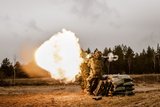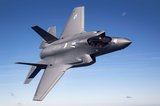Pilot dies in Myanmar military plane crash
A Myanmar pilot died on 3 April after a ‘technical failure’ caused his military jet fighter to plummet into a paddy field in the centre of the country, the Myanmar Army said.
A live video on Facebook showed flames billowing up from the crash site near Kyunkone village about an hour away from the capital Naypyidaw.
Local people found the unconscious body of the pilot attached to his parachute nearby and tried to drag him away from the scattered debris for medical help.
The army chief's office later confirmed on its Facebook page that the crash was due to a ‘technical failure’ and that the pilot died of his injuries on the way to a military hospital in nearby Taungoo town.
The post added: ‘An investigation is ongoing.’
Police told AFP that the single-seat F-7 jet fighter went down around 10am on 3 April morning while a military source said the pilot, Major Arkar Win, was in his mid-30s.
The F-7 is a Cold War era fighter jet – a Chinese made variant of the Soviet Union's original MiG-21 (pictured).
Myanmar has seen a spate of aviation accidents in recent years, including another military plane crash in June 2017 in which 122 people were killed.
Bad weather caused the Chinese-built Shaanxi Y8, which was carrying dozens of soldiers and more than 70 relatives of servicemen to crash into the Andaman Sea.
More from Defence Notes
-
![How might European countries look to tackle drone incursions?]()
How might European countries look to tackle drone incursions?
Disruption of infrastructure in Europe, whether by cyberattack, physical damage to pipelines or uncrewed aerial vehicles flying over major airports, as has happened more recently, is on the rise. What is the most effective way of countering the aerial aspect of this not-so-open warfare?
-
![Taiwan approved for $11 billion weapon purchase from US]()
Taiwan approved for $11 billion weapon purchase from US
The US State Department’s approval of a multi-billion-dollar sale of weapons to Taiwan includes tactical mission networks equipment, uncrewed aerial systems, artillery rocket systems and self-propelled howitzers as well as anti-tank guided missiles.
-
![US National Security Strategy prioritises advanced military capabilities and national industry]()
US National Security Strategy prioritises advanced military capabilities and national industry
The 2025 NSS has emphasised investment in the US nuclear and air defence inventory and national industry, but it leaves multiple unanswered questions on how the White House will implement this approach.
-
![Canada set to look away from its neighbour and across the Atlantic for partners]()
Canada set to look away from its neighbour and across the Atlantic for partners
While non-EU UK struggles to join the Security Action for Europe initiative, which provides loans for defence programmes, Canada has become the first country outside Europe to get access – and did so for a nominal fee.
























